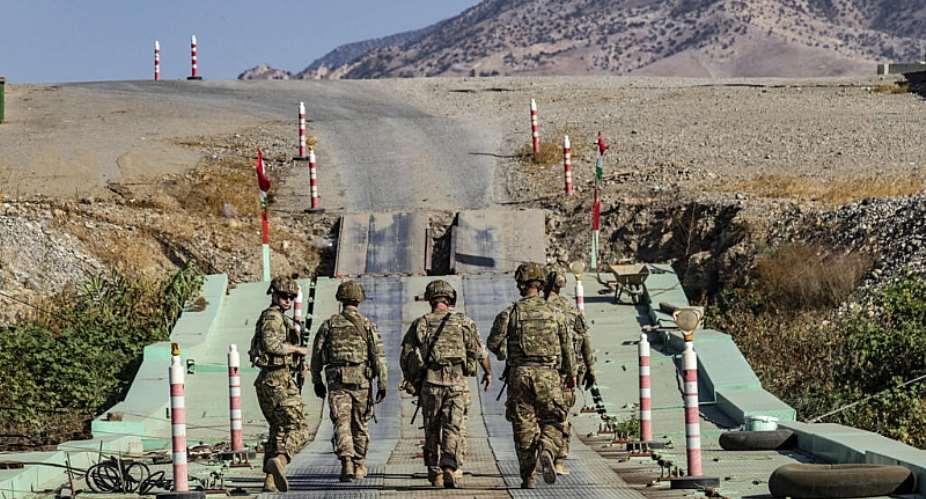Turkish military forces are carrying out an air assault on US-backed Kurdish forces in Syria, and Ankara has warned that a land operation may follow. The crackdown comes amid reports that Washington may pull its forces out of Syria and Iraq.
Turkey's government accuses Kurdish forces in north-eastern Syria of being linked to attacks on its army.
Turkish drone strikes are bombarding oil refineries and electricity production in the Syrian border region controlled by the Syrian Democratic Forces (SDF), a coalition of ethnic militias and rebel groups.
"The targets are energy infrastructure and that sort of stuff. Obviously, the goal is to make that area not sustainable, as a sustainable haven for the SDF," says Aydin Selcen, a former senior Turkish diplomat and now regional analyst for the Medyascope news portal.
The SDF's ranks include the Kurdish People's Defence Units (YPG) and Women's Protection Units (YPJ), which Ankara accuses of being affiliated with the Kurdistan Workers' Party, or PKK. The armed movement is considered a terrorist organisation by both Ankara and Washington.
"The end game as defined by the Turkish authorities is to prevent a terrorist statelet [being created] beyond Turkish borders," explains Selcen.
"This means allowing the PKK or its Syrian affiliates, the YPG and YPJ, to establish a local administration in that area. War on terror is perhaps the number one priority for this government."
Turkish President Recep Tayyip Erdogan last month threatened a new land invasion into Syria.
Turkish forces already control a large swathe of Syrian territory from previous operations against Syrian Kurdish forces.
Possible US withdrawal
The SDF is backed by a US military force of around 900 soldiers in the war against the so-called Islamic State group, raising the possibility of a conflict between NATO and its allies.
Ankara's ongoing assault comes amid reports that Washington is considering pulling its forces out of Syria and Iraq.
"Washington may be preparing to hand off SDF as a partner to the Syrian regime and saying: 'you guys sort yourselves out, we are actually going to leave'," said Turkey analyst Sinan Ciddi of the US-based Foundation for Defense of Democracies.
"The administration is apparently toying with the idea that it's no longer worth keeping US troops there because they are in harm's way," he said.
At least some in the US administration want to explore, if they pulled their troops from northern Syria, "the extent to which Turkey could sort out its problems with the Kurds via engaging with the Syrian regime", Ciddi added.
US-Turkey reset
A US withdrawal from Syria would relieve years of tension between NATO allies Turkey and the United States.
"Unfortunately, this relationship with the United States and YPG creates a barrier between Turkey and the United States," said Bilgehan Alagoz, a professor of international relations at Istanbul's Marmara University.
"A NATO ally should not act against other allies' national concerns," she said. "That's the main reason why Turkey perceives US policy in Syria as a national security concern."
With Ankara last month lifting its veto on Sweden's NATO membership and the White House reciprocating by green-lighting the sale of military jets to Turkey, the NATO allies appear to be seeking to reset ties.
Analyst Selcen warns time may be running out for the SDF.
"If the Americans leave, it will be very difficult for the SDF to survive unless they cut a deal with Damascus," Selcen said. "But the timing is of the essence, of course – they cannot get the same terms that they will get once the Americans leave."
Damascus compromise
But Selcen suggests if the SDF moves quickly, it could secure a deal with Damascus that ensures its survival – at least in the short term, given the weakness of the Syrian security forces.
"At the end of the day, they will have to come up with some kind of modus vivendi with [Syrian President Bashar Al] Assad. It does not mean that Assad will come to control this region again as he did. But they will have to come up with some sort of a solution with Damascus."
There could equally be advantages for the Turkish government, he believes.
"It will also be, in the end, a kind of a safe face-saving formula for Ankara, which can now take Damascus as the main interlocutor to deal with this [Kurdish problem]," Selcen said.
"All these sides will be very happy to see the American presence leave the region – with the exception of, of course, the Iraqi Kurds and the Syrian Kurds."
Opposition to the US military presence in Syria is rare common ground between Ankara and Damascus.
If Damascus was to retake control of the predominantly Kurdish region, analysts say, it could be enough for Erdogan to claim victory over the SDF, end Turkey's assault, and remove the main point of tension between Ankara and Washington.





 Court dismisses Serwaa Amihere case against Henry Fitz, two others
Court dismisses Serwaa Amihere case against Henry Fitz, two others
 Stolen BRVs: Bi-partisan parliamentary probe non-negotiable — Dr. Omane Boamah
Stolen BRVs: Bi-partisan parliamentary probe non-negotiable — Dr. Omane Boamah
 Bawumia begins regional campaign tour on Monday
Bawumia begins regional campaign tour on Monday
 With great urgency backed by verifiable data, facts and figures dismiss COCOBOD,...
With great urgency backed by verifiable data, facts and figures dismiss COCOBOD,...
 EC’s statement on obsolete BVDs discovery “lies, half-truths, pure fantasies” – ...
EC’s statement on obsolete BVDs discovery “lies, half-truths, pure fantasies” – ...
 Nalerigu court impound vehicles of DCE, Director of Chereponi district for owing...
Nalerigu court impound vehicles of DCE, Director of Chereponi district for owing...
 Cop, 7 others grabbed over $523,000 Gold Scam
Cop, 7 others grabbed over $523,000 Gold Scam
 Akufo-Addo’s driver wins Dadekotopon NPP Parliamentary Primary
Akufo-Addo’s driver wins Dadekotopon NPP Parliamentary Primary
 Investigate, jail persons liable for GRA-SML contract – Manasseh
Investigate, jail persons liable for GRA-SML contract – Manasseh
 Lawyer wins Akan NPP Parliamentary Candidate primary
Lawyer wins Akan NPP Parliamentary Candidate primary
